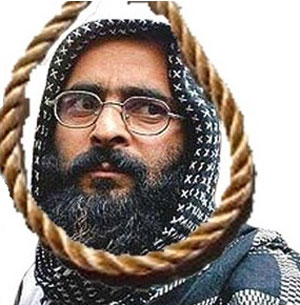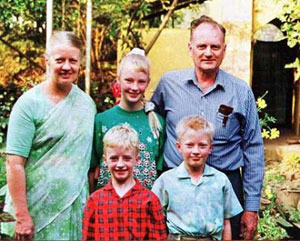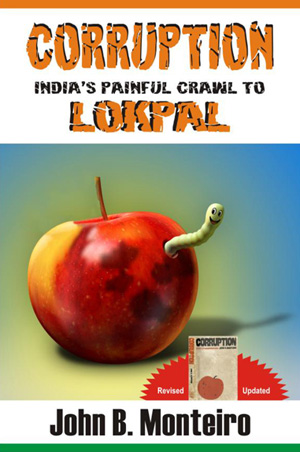Offbeat (28): Is death penalty outdated?
By John Monteiro
Bellevision Media Network
What heavy guilt upon him lies!
How cursed is his name!
The ravens shall pick his eyes,
And eagles eat the same.
- Isaac Watts, English religious poet (1674-1748).
12 Febraury 2013: In the wake of the hanging of Afzal Guru of terrorist attack on Parliament fame on February 8, 2013 and of Ajmal Kasab, the only survivor of the of the perpetrators of 26/11 terrorist attack on Mumbai targets last year, and the call for hanging of the gang rapists of Delhi, the death penalty as a factor in the justice delivery system has once again come into bold focus. Let us first look at the anti-death penalty lobby’s reaction to the hanging of Afzal Guru, as reported by J Balaji in The Hindu (10-2-13) and excerpted here.
 Even as the surrendered militant of Kashmir Mohammed Afzal Guru was hanged in the Tihar Jail, human rights activists have intensified their attack on the government, claiming it had violated international standards by not informing the convict’s family before the execution nor handing over his body to them for the last rites. This is the second hanging in recent times carried out by the Union government after that of Ajmal Kasab in a Pune jail on November 2, 2012 in the Mumbai terror attack case. Beyond this, the very question of death sentence has been decried by many.
Even as the surrendered militant of Kashmir Mohammed Afzal Guru was hanged in the Tihar Jail, human rights activists have intensified their attack on the government, claiming it had violated international standards by not informing the convict’s family before the execution nor handing over his body to them for the last rites. This is the second hanging in recent times carried out by the Union government after that of Ajmal Kasab in a Pune jail on November 2, 2012 in the Mumbai terror attack case. Beyond this, the very question of death sentence has been decried by many.
Human Rights Watch said in a statement: “The hanging of [Afzal] Guru, following closely behind the hanging of Kasab, shows a very worrying trend by the Indian government. HRW opposes the death penalty in all circumstances as an inherently irreversible, inhumane punishment.”
Another international HR organisation — Amnesty International — said [Afzal] Guru’s execution indicated a “disturbing and regressive trend towards executions shrouded in secrecy and the resumption of death penalty use in India.” AI India’s programme director Shashikumar Velath said in a statement: “We condemn the execution in the strongest possible terms. This, very regrettably, puts India in opposition to the global trends of moving away from the death penalty.”
India is among a minority of countries which continues to use the death penalty. In total, 140 countries — more than two-thirds of the world — are abolitionist in law or in practice. In 2011, only 21 states in the world executed, meaning that 90 per cent of the world was execution-free.
Amnesty International opposes the death penalty in all cases without exception, regardless of the nature or circumstances of the  crime; guilt, innocence or other characteristics of the individual; or the method used by the state to carry out the execution. “It opposes it as a violation of the right to life as recognised in the Universal Declaration of Human Rights and as the ultimate cruel, inhuman and degrading punishment”, Mr. Velath said.
crime; guilt, innocence or other characteristics of the individual; or the method used by the state to carry out the execution. “It opposes it as a violation of the right to life as recognised in the Universal Declaration of Human Rights and as the ultimate cruel, inhuman and degrading punishment”, Mr. Velath said.
The People’s Union for Democratic Rights termed Guru’s hanging “inhuman, brutal and arbitrary capital punishment.”
Reacting to the execution of Afzal Guru in Tihar Jail, Selvaraj Murugaiyan, State Coordinator, People’s Movement Against Death Penalty, said it was another Saturday that turned out to be a sad day for human rights observers across the world. Afzal Guru was hanged the same way as Ajmal Kasab which turned out to be a dangerous precedent. The PMADP, headed by Justice V.R. Krisha Iyer, believed that the death penalty was nothing but a planned murder by the state.
This takes us to another chapter of judicial history. The Supreme Court on January 23, 2011 upheld an Orissa High Court judgment that commuted the death sentence a trial court awarded to Dara Singh to life term for burning to death Australian Christian missionary Graham Stuart Staines and his minor sons Philip and Timothy on the night of January 22, 1999 at Manoharpur in Orissa. Dismissing the Central Bureau of Investigation’s plea to enhance the life sentence to death penalty, a Bench of Justices P. Sathasivam and B.S. Chauhan held that this was not one of the rarest of rare cases in which the death sentence should be awarded to the accused.
 The Bench dismissed Dara Singh’s appeal against life sentence and confirmed the High Court judgment awarding life term to co-accused Mahendra Hembram and acquitting 11 others for want of evidence.
The Bench dismissed Dara Singh’s appeal against life sentence and confirmed the High Court judgment awarding life term to co-accused Mahendra Hembram and acquitting 11 others for want of evidence.
Writing the judgment, Justice Sathasivam said: “It is clear from various earlier decisions that on conviction under Section 302 of the IPC, the normal rule is to award the punishment of life imprisonment, and the punishment of death should be resorted to only in the rarest of rare cases. In the case on hand, though Graham Staines and his two minor sons were burnt to death while sleeping inside a station wagon at Manoharpur, the intention was to teach a lesson to Graham Staines about his religious activities, namely, converting poor tribals to Christianity. All these aspects have been correctly appreciated by the High Court, which modified the sentence of death into life imprisonment, with which we concur.”
Expressing anguish at intolerance of other religions, the Bench said, “In a country like ours, where discrimination on the grounds of caste or religion is a taboo, taking the lives of persons belonging to another caste or religion is bound to have a dangerous and reactive effect on society at large. It strikes at the very root of the orderly society which the founding fathers of our Constitution dreamt of. Our concept of secularism is that the State will have no religion. The State shall treat all religions and religious groups equally and with equal respect, without, in any manner, interfering with their individual right of religion, faith and worship.”
The Bench hoped that Mahatma Gandhi’s vision of religion playing a positive role in bringing the country’s numerous religions and communities into an integrated prosperous nation could be realised by way of equal respect for all religions. At the same time, it said: “It is undisputed that there is no justification for interfering in someone’s belief by way of ‘use of force,’ provocation, conversion, incitement or upon a flawed premise that one religion is better than the other.”
“The analysis of entire materials clearly shows that the High Court is right in arriving at its conclusion. In the case on hand, there is no material to prove the conspiracy charge against any of the accused,” it said.
Terming some of the observations (highlighted above) of the Bench as gratuitous, leading editors, media persons and civil society members signed a statement taking strong exception, arguing that the remarks are unconstitutional and went against the freedom of faith guaranteed under the Constitution and asked for expunging these remarks. The Supreme Court has suo moto withdrawn these remarks and substituted the offending sentences with more innocuous ones. But it clearly shows that the death penalty could be decided either way by ill-tempered judges.
The subject is open to many views. What are yours? Chew on this!

John B. Monteiro, journalist and author, is Editor of his website, www.welcometoreason.com (Interactive Cerebral Challenger) – with provision for instant response. Try responding!
|
 Write Comment |
Write Comment |  E-Mail To a Friend |
E-Mail To a Friend |
 Facebook |
Facebook |
 Twitter |
Twitter |
 Print
Print | Comments on this Article | |
| Philip Mudartha, Qatar | Tue, February-12-2013, 9:43 |
| Miscarriage of justice is possible as the system is as imperfect or bad as the society which it serves. That in itself is a weak argument in favor of abolition of corporal punishment. If the society were to abhor violence in any form,(as Buddha and Gandhi envisioned, and christian faith was erected), the commitment to such vision requires abolition in any and all cases. Indians and their societies do not have that commitment and therefore has a long way to go before it can legislate death penalty out of the law books. | |




















